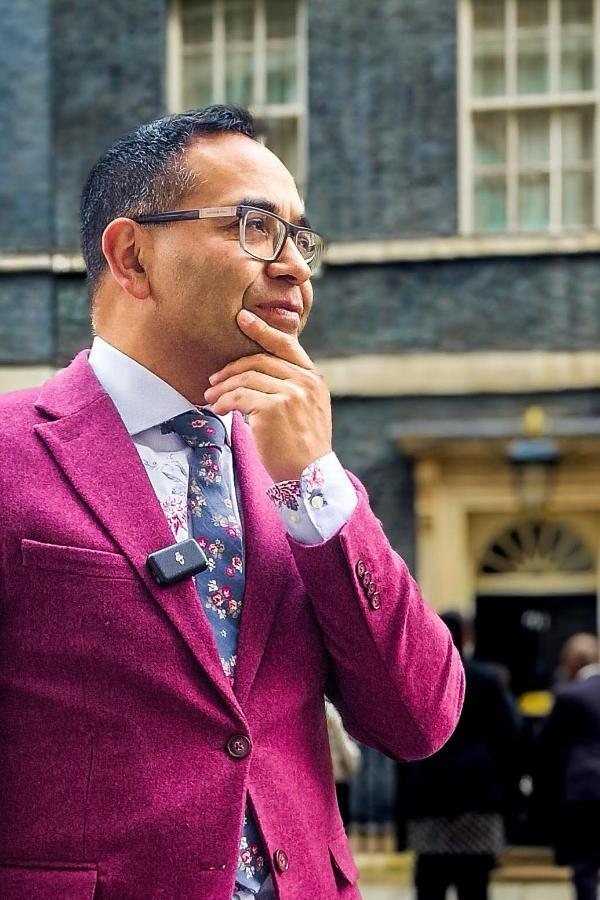I’ve been spending a lot of time recently in the upside-down world of the right-wing media outlet GB News.1 I usually enter the studios through an underground bunker directly opposite the Houses of Parliament. I descend from the very heart of British democracy into a dark space with no natural light—and, as a Christian, the symbolism of that is not lost on me. "Increasingly around the world, faith is being treated as a political crowbar: a tool to pry open voter bases, rather than a moral compass."
It feels like stepping into an alternate reality. Familiar facts are reinterpreted, long-established norms and doctrines are treated with suspicion, and outrage flows more freely than information. The lighting is harsh, the air recycled, and the atmosphere thick with contempt: us versus them, tradition versus decay, freedom versus control. I feel claustrophobic there—physically, spiritually, and ideologically.
I wish I could dismiss GB News as fringe media—but I can’t. There is conviction here. The presenters speak with passion and certainty. They are tapping into real fears and frustrations. And people are tuning in by the millions. They find a channel that is not afraid to tackle the big issues, or to challenge centuries of Christian teaching.
In a recent debate about refugees, one presenter said to me that while the UK’s Judeo-Christian heritage teaches us “to love our family, our cousins, our neighbours,” he added “that isn’t always as universal as people on your side of the debate would have it.”
He knew my conviction—that Christ’s radical, countercultural ethic of love extends not just to Jews, but to sinners, Gentiles, and all sorts of outsiders. Yet he had no qualms about upturning that doctrine to promote xenophobia and deny any responsibility for supporting refugees.
This limiting of love and excluding of empathy in the name of Christian theology is not an isolated example. Increasingly around the world faith is being treated as a political crowbar: a tool to pry open voter bases, rather than a moral compass. While many on the left often fail to acknowledge how Christian Scripture underpins values like human rights, equality, and the rule of law, those on the right often embrace the Bible as an activating force—but rarely pause to check whether their use of it aligns with the gospel’s core message. "It worries me when Christians are seduced into right-wing politics and support of toxic nationalistic and racist movements."
Baptist academic Dr. Helen Paynter describes the relationship as a symbiotic one: right-wing politicians crave the legitimacy and votes that come from church backing, while some parts of the church are drawn to the influence and recognition that come with political proximity.2
It’s a dangerous combination. What we’re seeing is both a conscious and unconscious co-opting of the church into partisan politics. Some church leaders know exactly what they’re doing in this political bargain. But many church members are unwitting pawns in a wider political chess game.
Initially I had thought this was a transactional relationship, that if a political party or movement would give the church its way on a few of its hot button issues then the church would, perhaps begrudgingly, give its allegiance. But in recent years I have come to discover that the support has become more full-throated. Many Christians are firmly buying into the political project of the far right. It is politically expedient for the far right to hijack holiness, because it gives them fertile ground for their seeds of hate. Meanwhile, the left are happy to distance themselves from Christians. One example of this was Hillary Clinton’s “Basket of Deplorables” comment in the 2016 election campaign against Donald Trump.
It worries me when Christians are seduced into right-wing politics and support of toxic nationalistic and racist movements. During the Nazi regime, the Apartheid government of South Africa, the Klu Klux Klan in the USA, 3 the transatlantic slave trade, the genocide of Rwanda or the mass murder of Indians in the Raj, it was church-attending, Bible-believing Christians who were too easily persuaded to adopt wicked and unjust ideologies that contradict the most basic of Christian teaching.
This points to a complete failure of the church to do its most basic task of discipleship-making. Most of our current strategies to help disciple and equip have proved completely incapable of stopping Christians from committing genocide, colluding with wicked authoritarian governments, and committing racist and ethnically-motivated violence.
So what can we do?
First, we must return to the heart of the gospel—not as a political tool, but as the radical call to love, humility, justice, and truth that it is. Discipleship must mean more than personal piety or church attendance. It must mean deep formation in the life, teachings, and priorities of Jesus—especially when they challenge our political preferences, national loyalties, or cultural assumptions.
Churches must have the courage to name and resist the misuse of Scripture. We need leaders who are willing to speak prophetically, not just pastorally—leaders who can discern when the gospel is being hijacked to justify hate or exclusion, and who are not afraid to call it out, even when it’s unpopular or costly.
". . . we need to disciple people in public theology—teaching them not just how to pray and read their Bibles, but how to think Christianly about politics, race, economics, and justice."We must also recover our confidence in the gospel itself. The early church grew not because it aligned with empire, but because it offered a radically different way of being human—one marked by love for strangers, hospitality in the midst of hostility, and solidarity with the suffering. That same gospel still has power today, and is desperately needed even within our churches.
And finally, we need to disciple people in public theology—teaching them not just how to pray and read their Bibles, but how to think Christianly about politics, race, economics, and justice. We need to help Christians understand that faithfulness to Christ might sometimes mean refusing loyalty to a political tribe. That loving our neighbour might mean challenging the very systems that benefit us. That following Jesus might mean carrying a cross, not waving a flag.
If we do not address the pull of Christians not just to the far-right, but more importantly towards hate, exclusion, and ideological capture—we risk repeating the darkest chapters of church history. But if we do, if we find the courage to reclaim the gospel from those who would weaponize it, the church can still be a light in the darkness. Not a political mouthpiece, but a prophetic witness. Not a pawn, but a peacemaker. Not an echo of the culture’s rage, but a living embodiment of Christ’s radical love.

